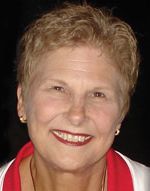Bonnie Olson: Breast Cancer

We’ve found that you have a lump and it must come out.” These were the words that I heard, dazed and terrified, in 2003. The radiologist didn’t ask if I had a ride home or if there was anyone with me in the waiting room. When I shared the news with my husband, we were panic-stricken. Our only previous experience with breast cancer was the death of my sister-in-law. It wasn’t until I met with a surgeon the following week that I was told, “This doesn’t have to be a death sentence.”
My treatment began with a lumpectomy, but when my surgeon determined that some cancer cells remained and that the sentinel node was cancerous, I chose to undergo a double mastectomy and chemotherapy. Later, I learned that because I was HER2-positive, I was eligible to participate in a clinical trial for trastuzumab (Herceptin), which at the time was approved to treat only patients with metastatic disease. I wanted to do everything I could to help protect my daughter from going through what I had gone through, and I decided to participate. During the trial I experienced side effects, such as aching bones and tingling feet, which went away a year after my treatment ended. Going forward, I will be monitored for 10 years to find out if my therapy has caused any adverse effects on my heart; so far, I have had none.
As it turned out, the trastuzumab trial I joined became one of the definitive studies that established the drug as a game-changing agent in the fight against HER2-positive breast cancer. A 4-year follow-up study showed that trastuzumab significantly reduces the risk of cancer recurrence and has improved survival by about 24%. It is now a standard part of therapy regimens for patients with HER2-driven tumors.
Today, I am an 8-year breast cancer survivor dedicated to helping other women combat the disease through my involvement at the Susan G. Komen for the Cure Southwest Florida Affiliate. My story is exciting to share with those affected by breast cancer because I recovered. Unfortunately, this is not the case for all women with HER2-positive breast cancer. Important research advances have been made, but funding is more crucial than ever because important challenges remain. Some HER2-positive breast cancer patients are unresponsive to trastuzumab or develop resistance to it; treatment toxicities threaten other survivors.
When we consider that HER2-positive tumors represent only about 20% of all breast cancers – and remaining questions surround all breast cancer subtypes – it is even more apparent that significant, ongoing federal investment in breast cancer research is crucial. We must continue to make advances and not lose momentum when breast cancer is the most frequently diagnosed cancer in women.